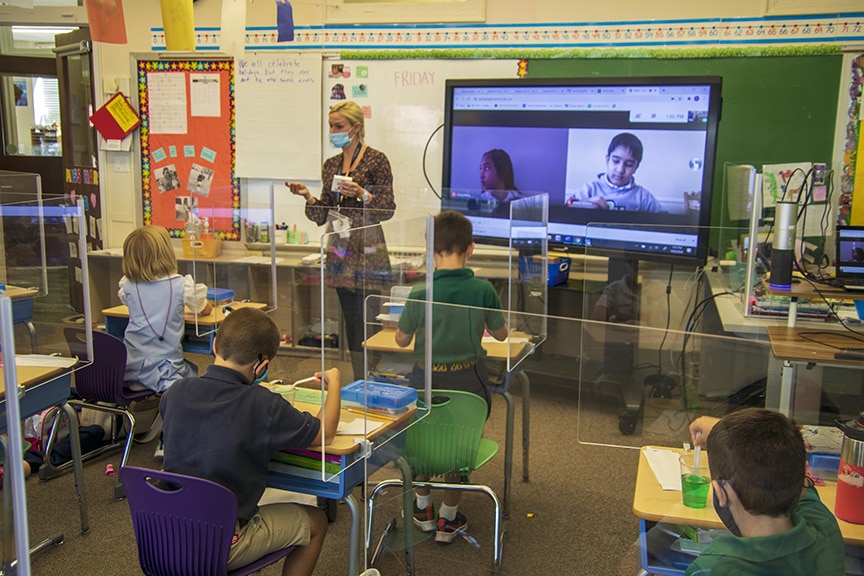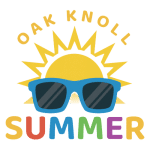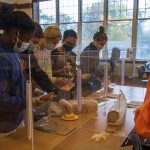Oak Knoll Prioritizes Hands-On Learning Curriculum
 In this continuing COVID-19 era, much has changed for children who are attending school in person. Reduced capacity classrooms look different this year, readied with plexiglass desks, and spaced out 6 feet apart.
In this continuing COVID-19 era, much has changed for children who are attending school in person. Reduced capacity classrooms look different this year, readied with plexiglass desks, and spaced out 6 feet apart.
Although the children and teachers are sitting and standing further apart than they are used to, hands-on learning is still very much alive at Oak Knoll School.
Backed by general research that says students learn better when they are actively engaged in the classroom, Oak Knoll’s Lower School rolled out innovative curriculum changes this fall packed with active, hands-on learning strategies in each new program.
In its debut year, Oak Knoll’s pre-K Little Acorns program launched its Connect4Learning Curriculum, developed through funding from the National Science Foundation.
This curriculum uses research-based and classroom-tested foundations in literacy, science, social-emotional, and mathematics learning. Connect4Learning weaves together these four domains to ensure that each subject is addressed meaningfully and comprehensively with Oak Knoll’s youngest students.
Hands-on learning is woven throughout the new Connect4Learning curriculum, said Marissa Barbarino, Oak Knoll’s lead preschool teacher.
“During our center time, preschool students receive their own individualized bags, including board games, science manipulatives, letter writing and fine motor activities without worrying about germs,” said Barbarino. “Twice a week, they also select their own books that are kept in a bag with their names on it.”
Barbarino explained that her students love to create floor puzzles where they work together to pick a few pieces each and then join their parts together to make the puzzle whole.
“The new norm has been working out great with the new preschool curriculum program and it is truly 21st century teaching for our 21st century children,” she said.
Similarly, the new myWorld interactive social studies curriculum for grades 1-3 encourages active questions while introducing civics, economics, geography, and history concepts. Here, students develop critical thinking, problem solving, and communicating skills for engaged civic life.
The myWorld program includes strong language arts connections to support social studies inquiry while also enhancing literacy skills.
Literacy skills at Oak Knoll have been boosted also through a new research writing curriculum in the Lower School grades 2-6.
Its goal is to create a clear scope and sequence for research writing in grades 2 through grade 6 and to plan for students’ research writing to grow in accuracy and complexity over time.
Kathleen Hoke, Oak Knoll’s fifth grade language arts teacher said with the new research writing curriculum, students are gaining important hands-on experience.
Hoke’s students this year will write research papers then host an interactive wax museum game in May and students dress up as their research subjects.
“The students will stand behind their desks dressed up in clothes that their famous American would have worn,” said Hoke. The class will then play an interactive guessing game with parents to guess who the student’s research paper character is,” she said.
Hands-on learning is also infused in Oak Knoll’s new blended learning science program for grades 3-6, STEMscopes NGSS 3D – an award-winning, phenomena-based program that aligns with the Next Generation Science Standards.
Each STEMscopes chapter is built on the 5E lesson model — Engage, Explore, Explain, Elaborate, and Evaluate. Students’ science knowledge will be enhanced by cross-curricular connections to song and dance, art and sculpture, engineering and design, and math and data analysis.
Students will still have access to many hands-on projects with opportunities to utilize kit materials for STEM investigations.
“Hands-on inquiry based science, although highly impacted by COVID-19 as we are not in the lab, is still very much alive,” said Lower School science teacher Sarah Thornton.
Thornton’s third graders are studying meal worms and have collected data about them while learning each stage of their life cycle, and now are observing different kinds of seeds growing in bags on their plexiglass. They also dissected lima beans to see what is inside of a seed. The fourth grade class is examining the inside of stems and fruits while studying plant adaptations.
Thornton’s 5th grade class is now observing worms at their desk and working on class-wide experiments about them answering such questions as “Do worms prefer soil or food scraps?”
“Fifth graders are also studying whether plants can grow with only air and water,” said Thornton. “Students have displayed a mini hydroponics system in a Ziplock bag taped on their plexiglass around their desks,” she said.
In sixth grade, Thornton’s students spaced out outside recently to investigate the different cavities of a cow heart during a lesson about blood flow and the circulatory system. Two other stations during this activity showed how the heart acts as muscle using water and tennis balls.
Also infused throughout lessons this year in Oak Knoll’s kindergarten classes is Oak Knoll’s new Anti-Bias Building Block early childhood curriculum program. This was brought into the program this year by kindergarten teacher Sara Sykes.
With this new program, students will learn to develop a sense of identity, appreciation for diversity, an understanding of justice, and tools to be an up-stander.
Through the common core standards of reading, writing, speaking, and listening and language, students will also learn about communication, respect, identity, differences, bias, and bullying.
For more information about Oak Knoll’s Lower School Curriculum, please visit our website.







